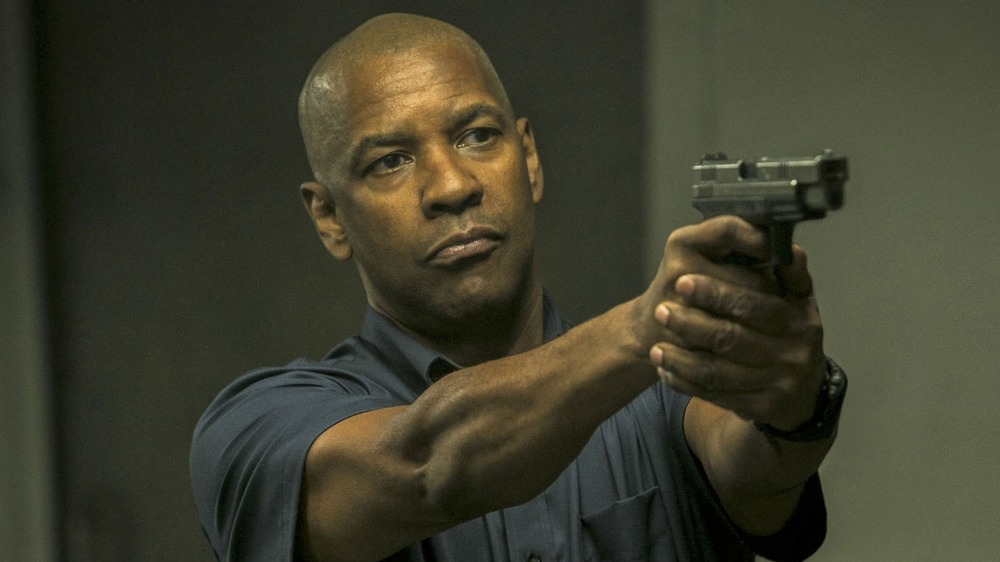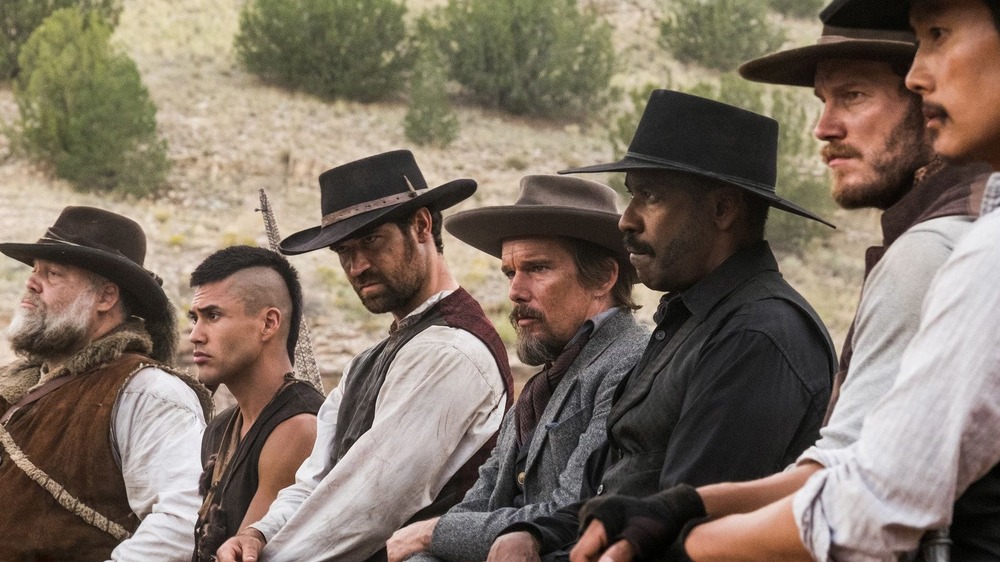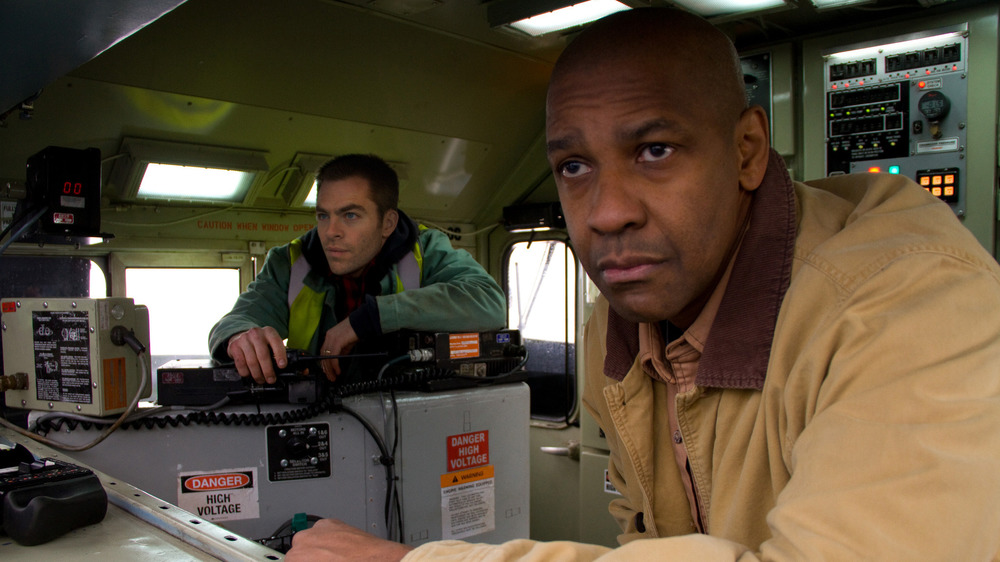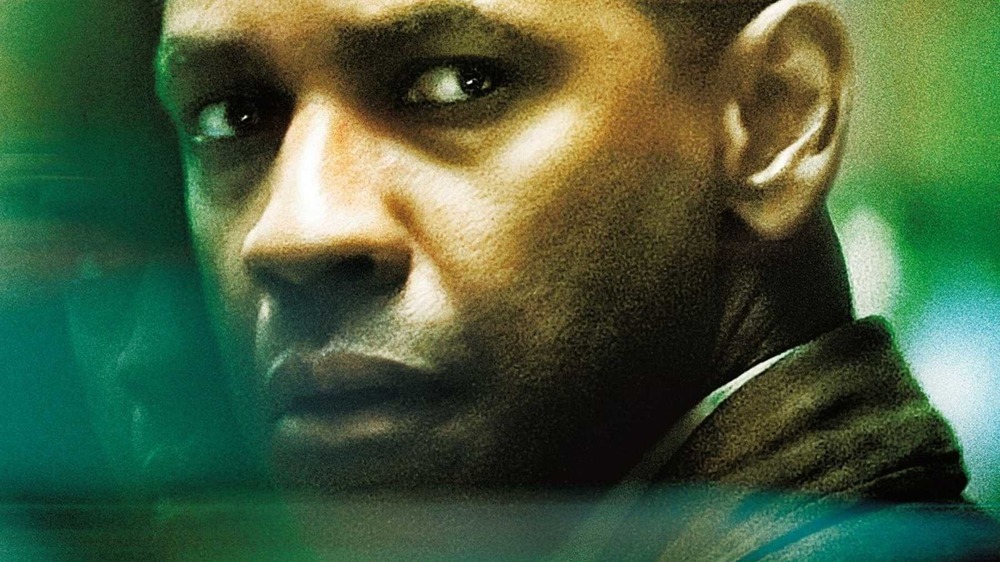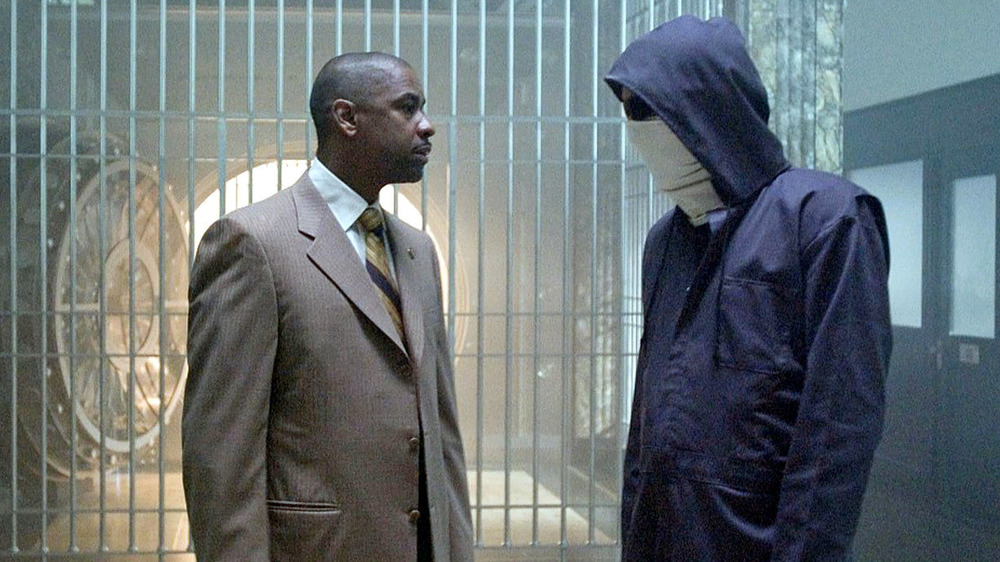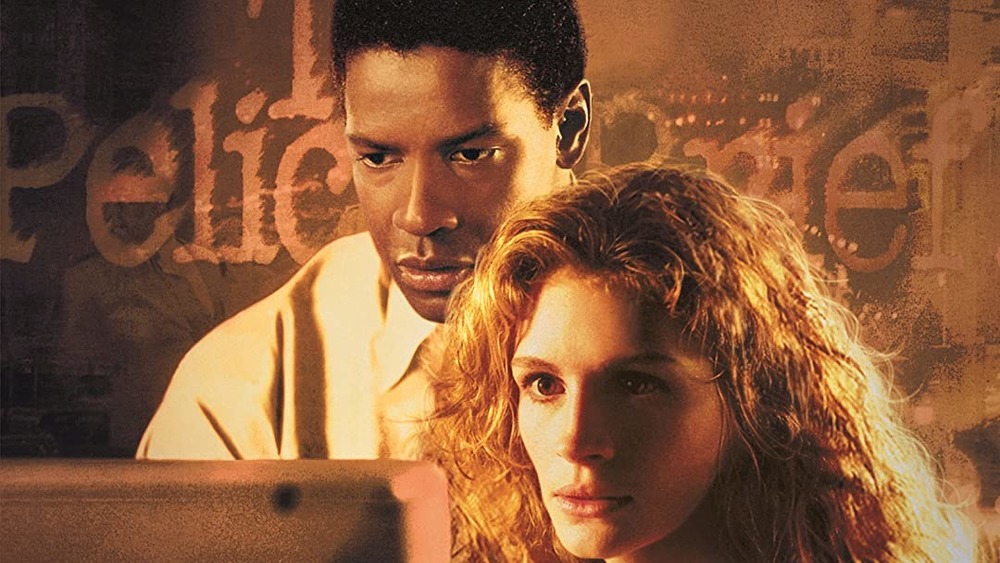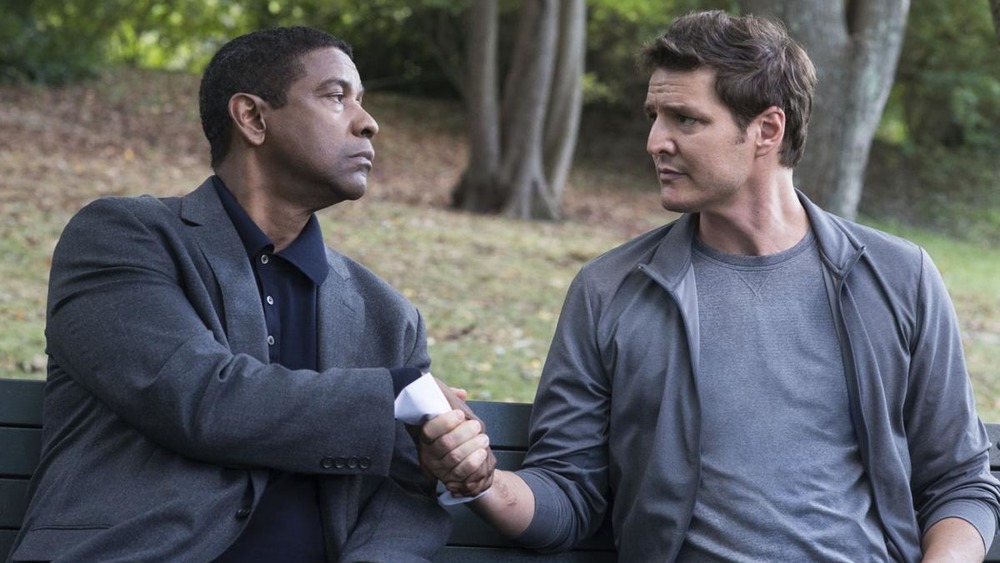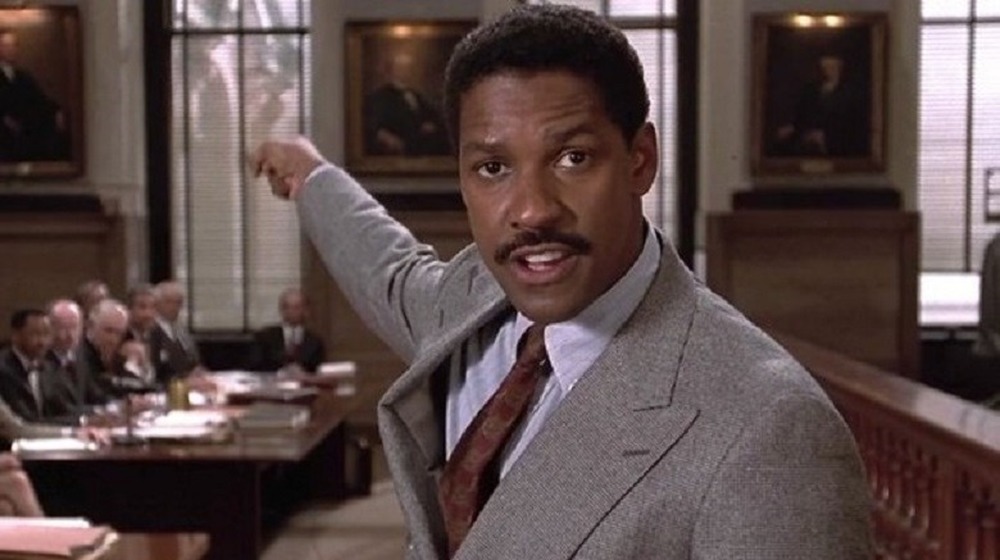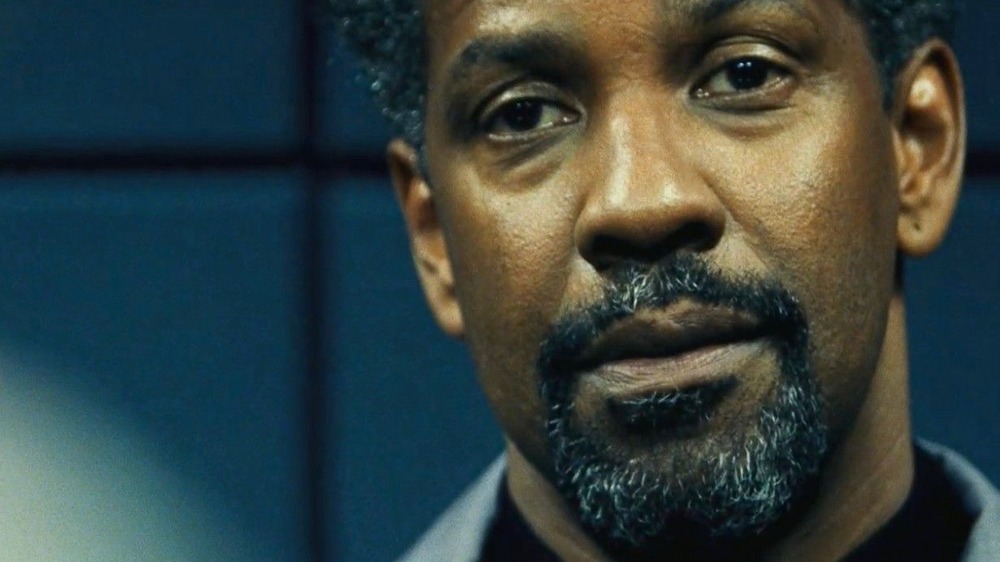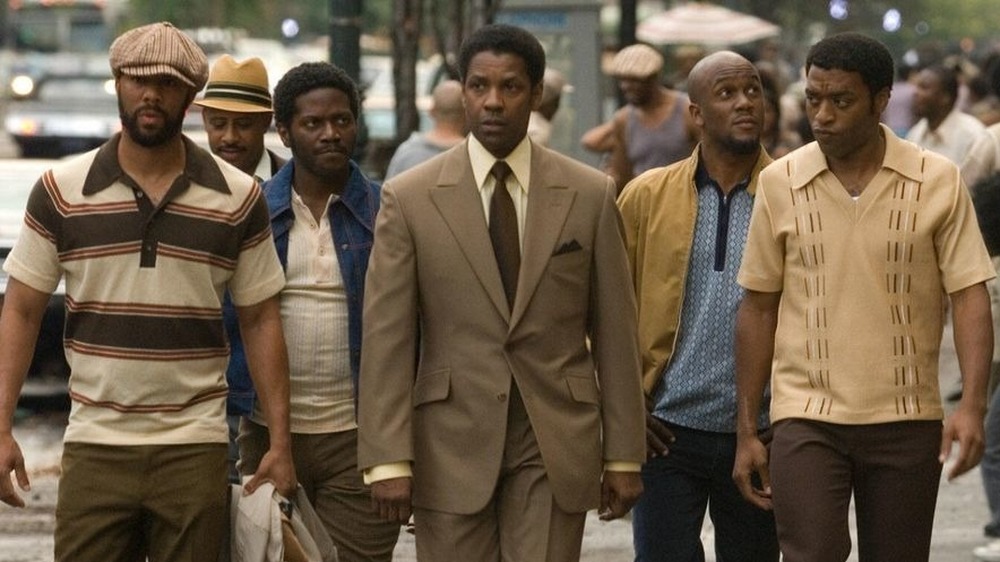The Biggest Denzel Washington Movies Of All Time
As the years go by, Denzel Washington becomes increasingly more and more of an anomaly among modern movie stars. Whereas most big-name actors today got their claim to fame starring in a $200+ million blockbuster, usually with a Marvel or DC Comics logo attached, Washington has largely steered clear of blockbuster fare in his career. Even Washington's forays into action movies are unorthodox by today's standards. Aside from a few sequels and remakes, Washington's biggest movies have been original films that lure in audiences with compelling story hooks rather than familiar brand names.
Going this route, Washington may not have starred in any movies that have grossed $1 billion worldwide, but he's become the rare modern actor who's turned his own name into something that can lure in audiences. Across his biggest movies of all-time at the worldwide box office, one begins to appreciate that Washington is an actor who's a throwback to the classic days of Hollywood, when a famous face on a poster was enough to get people to see your movie. But what are his most successful movies? Which Washington films have earned the most cash at the box office? From Westerns to gangster flicks, here are the biggest Denzel Washington movies of all time.
Denzel Washington helped bring Westerns back with The Magnificent Seven
For the longest time, modern Westerns were looked at as box office poison. Still, there were signs of life in the genre as early as 2008, when the decent box office numbers for Appaloosa led Entertainment Weekly to declare, "America always comes out for a good Western." That observation proved especially true throughout the 2010s, when the Western began to see a resurgence at the box office thanks to hits like True Grit, Rango, and Django Unchained. Suddenly, the Western, once thought to be deader than Jesse James, was back. The modern resurgence of the genre was reinforced with the 2016 remake of The Magnificent Seven, which owed much of its box office success to the presence of Denzel Washington in the lead role.
So indebted to Washington was the film's box office that, after The Magnificent Seven's $35 million domestic opening weekend, The New York Times was inspired to publish a piece entitled "The Box Office Power of Denzel Washington." Combining Washington's draw as an action movie star with the box office appeal of Magnificent Seven co-star Chris Pratt made the film an easy box office winner, though its $68.3 million overseas gross made it clear that this movie was much more of a domestic draw than an international one. But no matter, Magnificent Seven's worldwide gross of $162 million was sturdy enough to both add another box office winner to Washington's filmography and to cement that the Western was back.
No one could stop Unstoppable
Dating back to cinema's earliest creations such as Arrival of a Train at Le Court or The Great Train Robbery, cinematic stories involving trains have always been a reliable way to get audiences into theaters. That appeal is especially potent when you've got a bona fide movie star like Denzel Washington on board as your leading man. Both of these widely beloved ingredients came together in director Tony Scott's final feature film, the widely acclaimed thriller Unstoppable. The story of a speeding locomotive that lives up to its title, the project paired Denzel Washington with Chris Pine and was launched in 2010. While not Washington's biggest movie, it did deliver a strong box office haul of $167.8 million worldwide.
By this point, Scott and Washington had become a director/actor pair who could reliably deliver creatively plotted thrillers aimed at grown-ups. The audience goodwill the two had built up did a lot in getting Unstoppable to its solid worldwide gross, though it also helped that the film had an easily explainable premise. An out-of-control train was something that could be easily communicated as having immense stakes to anyone on the planet. It didn't hurt that Chris Pine was around in his first leading-man gig after the massive success of Star Trek and that Unstoppable provided adult-skewing counterprogramming for a bunch of kid-oriented movies that debuted in November 2010. All in all, the robust box office of Unstoppable added yet another example of train-centric cinema being something that easily grabs moviegoers.
Denzel Washington visited the sci-fi genre with Deja Vu
The concept of deja vu is that you're supposed to feel like you're reliving events you've already experienced. It's unlikely that audiences would feel such a sensation when faced with the prospect of Denzel Washington starring in a science fiction movie. By 2006, Washington had explored a number of different genres ranging from Shakespearean dramas to romantic comedies to political thrillers. But with Deja Vu, Denzel Washington was heading into sci-fi territory, a terrain he'd only previously explored in the 1995 film Virtuosity. It wasn't a genre audiences were accustomed to seeing Washington inhabit, hence why general moviegoers were unlikely to experience their own sense of deja vu while watching it. In the end, though, Washington's lack of experience with headlining sci-fi projects didn't seem to hurt the film's box office chances.
Deja Vu opened over Thanksgiving 2006 and grossed $64 million domestically. That sum was behind the domestic hauls of Washington's preceding two movies, The Manchurian Candidate and Inside Man. This could be attributed to distributor Touchstone Pictures deciding to open the action film mere days after the gargantuan blockbuster Casino Royale. However, Deja Vu's box office story was not over. The broader nature of the film's sci-fi premise ensured it had plenty of appeal for overseas viewers, who ensured the film got to a solid $181 million worldwide total. Deja Vu's box office didn't suggest Denzel Washington was the next sci-fi mainstay, but it was still good enough to make it a worthwhile return to the genre.
Inside Man got away with millions
Throughout his career, Spike Lee movies have secured solid box office grosses for their modest budgets. Do the Right Thing didn't need to make Avengers: Endgame money, for instance, because of its miniscule $6 million budget. But for Inside Man, Lee was playing in a different ballpark. The star-studded thriller's $50 million budget wasn't gargantuan, but it was a sizeable increase from his prior movies. Luckily, Lee managed to craft a film that didn't just hit new box office highs for himself but also his leading man, Denzel Washington.
In its domestic box office debut, Inside Man – the twisty tale of a detective (Washington) going up against an incredibly clever bank robber (Clive Owen) — managed to impress right away by nabbing opening weekend records for both Lee and Washington. That was a particularly impressive feat for the actor, who'd spent the last few years carving out a niche for doing successful adult-skewing thrillers. This bow set the film well on its way to profitability, which it managed to achieve with a $185.7 million worldwide gross.
Inside Man was given a box office boost by a shrew decision to release the title in March 2006, a time period where there weren't a lot of other thrillers around in the marketplace to compete with. Universal's marketing, which featured slickly edited trailers and distinctive posters, also helped give the project as did positive reviews from both critics and audiences (the latter of whom gave the film a B+ CinemaScore). All those factors allowed Lee and Washington's work on Inside Man to hit such significant box office highs.
The Pelican Brief paired Washington with Julia Roberts
Something worth noting about The Pelican Brief is that it's one of the rare box office hits for Washington where he doesn't get top billing. Washington has done many two-hander movies, but in projects like 2 Guns or Unstoppable, he's usually the first-billed star coaching a younger costar. Here, though, Washington was technically the co-lead to Julia Roberts, who made The Pelican Brief her first lead role after skyrocketing to fame with her early 1990s hits Pretty Woman and Sleeping with the Enemy. Those hits ensured Roberts would get the top spot on this production.
Though The Pelican Brief – based on the Josh Grisham novel about a law student on the run from assassins — came after a nearly three-year-long hiatus from lead roles for Roberts, her appeal to audiences hadn't withered away in that period judging by The Pelican Brief grossing an outstanding $187.9 million worldwide. However, she wasn't the only reason the film excelled financially. Washington and his widely acclaimed performance here also proved a significant draw for moviegoers. The combination of these two actors in 1993 gave The Pelican Brief a box office haul that was big enough to score significant financial accomplishment for Washington.
Pelican Brief became the first Washington movie to crack $100 million worldwide. As the past three decades have shown, it would be far from the last time a Washington vehicle would pull in those kind of impressive numbers. With that kind of box office pull, it's clear why Washington would very quickly end up getting top billing in his movies after The Pelican Brief.
The Equalizer 2 proved the power of Denzel Washington
Prior to the release of The Equalizer 2, there was some trepidation over the film's box office prospects. Pre-release projections saw it opening lower than its predecessor while mixed reviews and a large four-year wait between installments seemed to signal financial trouble for Denzel Washington's first-ever sequel. It didn't help that 2018 had already seen a number of sequels — such as Solo: A Star Wars Story and Pacific Rim: Uprising – make considerably less than their respective predecessors. However, despite so many foreboding pre-release factors, The Equalizer 2 ended up blowing past expectations in its box office run.
This feat was made immediately apparent when The Equalizer 2 topped the domestic box office on its July 2018 opening weekend. Adrian Smith, head of domestic distribution for Equalizer 2, distributor Sony/Columbia knew exactly why the sequel overperformed. "It really speaks to the power of Denzel, without a doubt," Smith reflected. "We expect it to play to a great multiple."
Washington's allure certainly played a large role in Equalizer 2's success, but it also helped that there was a dearth of R-rated movies in the summer of 2018. This gave the project a level of specialness that was missing in other underperforming 2018 sequels. The overall positive audience reception of the first Equalizer solidified that The Equalizer 2 was able to handily overcome expectations. By the end of its run, Equalizer 2 had gone from a predicted underperformer to a profitable hit with a $190 million worldwide haul.
The Equalizer far surpassed the source material
While The Equalizer was a popular show in its initial run, it didn't exactly have a massive lasting influence on pop culture. Prior to its 2014 film adaptation, it's likely modern audiences were mostly aware of it as the show Rob Reiner furiously wanted to watch uninterrupted in The Wolf of Wall Street. Normally, movie studios tend to only adapt source material with rabid, thriving fanbases. But that low level of pop culture notoriety turned out to be an asset when Washington starred in a feature film adaptation of the show.
The minimal modern popularity of the original Equalizer show — a series about an ex-special agent who sticks up for the downtrodden — meant that the filmmakers and marketers tasked with delivering Washington's Equalizer didn't have to grapple with fan expectations of whether or not the movie adapted the property properly. Instead, the project was sold as a standalone Denzel Washington revenge thriller. That was enough for general moviegoers, who showed up in large numbers to check the movie out at the end of September 2014, a timeframe that allowed The Equalizer to be by far the biggest action movie in the marketplace.
Without any other major titles to compete against, The Equalizer scored what was then one of the biggest domestic openings ever in September. After that impressive debut, The Equalizer went on to gross $192.9 million worldwide. Washington's appeal as an action star and a savvy release date meant that The Equalizer became a box office hit that managed to grow far beyond its source material.
Philadelphia was an international hit
Typically, Denzel Washington movies do better domestically than internationally. After all, Washington usually does movies that either utilize brand names (The Equalizer) or genres (Westerns) that have a lot more appeal domestically than worldwide. However, a notable departure from this norm came with Philadelphia, a 1993 drama from director Jonathan Demme. Along with fellow '93 hit The Pelican Brief, Philadelphia – with its $201 million worldwide gross — proved an important benchmark in Washington's career by helping to solidify him as a major box office draw. Another remarkable feat, though, was how Philadelphia – the tale of a homophobic lawyer coming to the defense of an HIV-positive client — became the rare Washington vehicle to make significantly more internationally ($124 million) than it did domestically ($77.3 million)
What created the discrepancy? One word — Oscars. Many of Washington's biggest movies domestically are action movies that have plenty of explosions but no Oscar chances, thus robbing the films of a potential way to market themselves to foreign moviegoers. That wasn't the case for Philadelphia, which won two Oscars at the 66th Academy Awards, including one for Tom Hanks for Best Actor. Philadelphia didn't debut in many key foreign territories until after it won these awards, which allowed it to promote itself to foreign moviegoers as being an Oscar-winning movie. In the process, Philadelphia immediately stood out in the marketplace and attracted a sizeable amount of overseas moviegoers that helped it to become one of Washington's biggest films.
Denzel Washington helped Ryan Reynolds find action success with Safe House
For the longest time, Ryan Reynolds just couldn't seem to land a successful action movie. The movies that put him on the map as a lead actor were lucrative comedies like Van Wilder and The Proposal. Success in that field didn't translate to big-budget blockbusters, though, which resulted in pre-Deadpool duds like Blade: Trinity, Green Lantern, and R.I.P.D. Reynolds would be the first to admit that his career's been littered with tentpoles that were box office busts. One notable exception to this rule came in February 2012 with the movie Safe House. How did Reynolds beat out his losing streak? It was simple really — he got paired up with Denzel Washington.
Washington, fresh off a series of R-rated action movies that had amassed strong box office grosses, was just the kind of guy people wanted to see in an action thriller like Safe House. Reynolds got lifted up by the Washington tide, and the result was a movie that hit $208.5 million worldwide. For comparison's sake, that was only $11 million less than the worldwide total of Reynolds' Green Lantern despite Safe House costing nearly $120 million less than that superhero tentpole. Clearly, in the process of delivering one of his biggest movies, Washington also managed to give Reynolds a rare pre-Deadpool box office break.
American Gangster is Washington's biggest movie
In some respects, American Gangster – a film about the rise and fall of mobster Frank Lucas — looked like it had the potential to be a star-studded box office flop. And the head of the film's distributor, Universal, openly admitted that Ridley Scott's crime epic beat the odds. "This is ... an R-rated film that runs over 150 minutes," then-Universal president of domestic distribution Nikki Rocco said after the film's opening weekend. But as Reed also noted in that statement, a perfect storm of elements led to American Gangster vastly overperforming at the box office.
These elements included the film's leading men, Denzel Washington and Russell Crowe, who, at the time, were hot coming off beloved titles like Training Day and Gladiator, respectively. The crime movie drama was in peak popularity thanks to recent Best Picture winner The Departed. Then there was the fact that in the two months leading up to its November 2007 debut, not a lot of titles had made a significant impact at the box office. The market was primed for a crowd-pleasing hit.
Put all those elements together, and you've got a recipe for a smash hit movie like American Gangster, which grossed $267.9 million worldwide, a sum that makes the title the seventh-biggest movie ever directed by Ridley Scott, and it still ranks as Washington's biggest movie ever. Thanks to a perfect storm of circumstances, American Gangster amassed a box office total so rich that it would make any real-life gangster happy.
